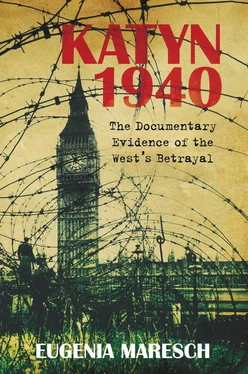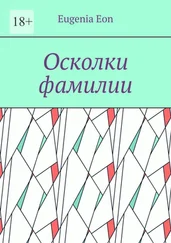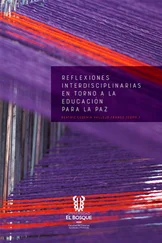A. General organisation of works
Once the decision was made regarding exhumation work, the Executive Committee and Chief Director of the PCK , [Władyław] Gorczycki, took charge of the organisation. It depended on:
a. Completion of the Technical Commission and selection of a new leader in place of Mr Rojkiewicz.
b. Provision of suitable equipment, clothing and office materials for the Technical Commission.
c. Arrangement of communications between Warsaw and the Technical Commission on site.
d. Establishment of the means of contacts with the families of identified victims.
e. Arrangement of a suitable form of transportation and preservation of the deposits (documents and memorabilia).
f. Establishing the form of new graves.
I must point out here, that contact between Warsaw and Katyn was entirely dependent on the whims of the Germans and it was a failure. The work in Katyn was carried out far from the normal conditions of any organisation, which had to be improvised. Only the exceptional dedication and energy of the Commission members, especially those that stayed there to the end, had any serious influence on the results of the work.
Ad/a. As mentioned before, there was a plan to send a new supervisor of works and others, following Mr Rojkiewicz’s return from Katyn, and now with a clear picture, the fear arose that the loss of each working day might be irreplaceable due to the expected approach of warmer weather, which would stop the exhumation work till autumn. Additionally, the possibility of military operations moving to the west of Smolensk increased our fears. It was decided not to waste any more time but to dispatch a new supervisor, as per my plan, during my stay in Katyn. The special requirements of physical resilience against the smell of decomposed bodies had made the choice of personnel difficult.
On 19 April, the following left Warsaw for Katyn: Hugon Kassur, head of the Office of the Plenipotentiary of the Executive Committee of the PCK for the Warsaw District was chosen to lead the committee, accompanied by Gracjan Jaworowski, a clerk and Adam Godzik, a labourer. Precise instructions were not given to Kassur but his task was to continue the work started by Rojkiewicz; if possible speed it up and send regular reports about the progress made and needs of the Commission and refer to them for advice on important issues. Kassur, who found himself in unexpected circumstances as regards communications, did not let us down with his organisational skills and initiative.
The German authorities in Kraków insisted on increasing the Technical Commission by three doctors specialising in forensic medicine (at first three were suggested), the choice depended on Dr Beck, the German Head of the Institute of Forensic Medicine in Kraków. Dr Schebesta had recommended to Dr Beck three candidates, one each from Warsaw, Kraków and Lwów, adding that Dr Marian Wodziński, could be sent straight away with three helpers [laboratory assistants] namely: Władysław Buczak, Franciszek Król and Ferdynand Płonka. This group departed for Katyn on 27 April 1943. Finally, Messers Stefan Cupryjak and Jan Mikołajczyk, both working [in administration] for the PCK , departed on 28 April 1943.
Dr Marian Wodzinski’s Report
My name is Dr Marian Wodziński, [23] PISM KOL 12/4/37, a full report was compiled and written in September 1947 in London.
I was born on May 28th 1911 at Tarnów, my parents being Władysław and Rose nee Rusinek. I am a Roman Catholic. Higher education – Doctor of Medicine. Before 1939, I lived at Cracow [Kraków], at 16 Grzegorzecka [Street].
After having qualified at the Faculty of Medicine of the Jagiellonian University in Kraków in 1936, I held the post of Junior Assistant in pathological anatomy at the University under Professor Stanisław Ciechanowski until 31 August 1937. After that I became Senior Assistant in Forensic Medicine at the Jagiellonian University under Professor Jan Olbrycht. In 1939 I was nominated as medical expert in forensic medicine to the Court of Appeal in the Kraków District. After the outbreak of war, I continued to work as Assistant in the Institute at Kraków until December 1944. The Director of this Institute was Professor Olbrycht. In March 1940, Professor [Gerhard] Buhtz of Forensic Medicine in Wrocław (Breslau) [ Professor der gerichtlichen Medizin und Kriminalistik an der Universitat Breslau ], came to the Institute to announce that a German doctor would be assigned to the Institute to conduct all the legal expert work connected with the Germans. At that time I came in touch for the first time with Professor Buhtz, to whom I was introduced by Professor Olbrycht. In April 1940 the occupation authorities appointed a German doctor, Dr Werner Beck, an Assistant to Professor Buhtz, as a Director of the Institute. In spite of this, even during the period of German management, all the staff of the Institute was Polish, with the exception of the administration of the Department of Serology and Department of Weapon Identification.
Dr [Jan] Zygmunt Robel in particular, worked as Director and legal expert in the field of medical chemistry in another building but at the same Institute. In May or June 1942, Professor Olbrycht was arrested by the Germans and taken off to Oświęcim (Auschwitz). The work at the Institute was unpleasant and several times I asked Dr Beck to release me, giving the reason as bad health. To this request I received the answer that my choice was either continue working at the Institute or go to the concentration camp at Auschwitz.
Independently of my work at the Institute, I worked as a doctor for the PCK at Borek Fałęcki near Kraków and as a doctor for the Social Insurance administration in the same place. From March 1940 I belonged to the Underground Organisation ZWZ [ Związek Walki Zbrojnej – Union of Armed Struggle] and from 1943, to the AK [ Armia Krajowa – Home Army].
The Nation Confronts the Murder
I knew about the case of Polish officers lost in Russia at the end of 1939, when talking casually with my friends who lived in German occupied territory, but whose next of kin were in Russian captivity. From these conversations I realised that there was great anxiety as to their fate on account of sudden cessation of all correspondence from them in the spring of 1940. I got this impression, in particular, from conversations with the wife of Colonel [Adam] Maciąg, who was at Starobielsk and with other members of the families of Professor Stefan Pieńkowski and Major Dr [Wiktor] Kaliciński, who were at Kozelsk. The families of these people, good friends of mine, feared the worst as a result of cessation of the correspondence but they did not give up the hope that perhaps the Polish prisoners had been sent somewhere farther into Russia, from where communication would be very difficult. As a result of this, they lived under a great strain, continually expecting some news of their next of kin.
Because of the large number of members of families of the several thousand Polish prisoners lost in the USSR, a great number of whom came from the German-occupied territories, the German communiqués about the Katyn discovery came as a great shock to the whole Polish nation. In spite of having lived through several years of cruel German occupation at first one could hear on every side doubts expressed that a crime of such colossal magnitude could be committed, especially by the Soviet authorities. As a result, Polish opinion was divided into two camps, those who did not believe in the German communiqués and regarded them as propaganda tricks and the others who believed them to be true. The Katyn discovery aroused universal interest and commotion and became the subject of many discussions and conversations, everybody trying to get hold of the information so far as possible direct from independent sources.
Читать дальше












